LL6008 Asylum Law: Legal Basis, Application, Credibility and Procedure
VerifiedAdded on 2023/01/19
|12
|5449
|84
Report
AI Summary
This report provides a detailed analysis of asylum law, focusing on the legal basis for asylum claims, the requirements an applicant must meet, and the relevant legal provisions and case law, particularly within the UK context. It explores the two-pronged test for determining asylum eligibility, encompassing both subjective fear and objective evidence of persecution. The report examines the role of the Home Office in assessing the credibility of asylum seekers, highlighting the factors that influence this assessment, such as internal and external inconsistencies in a claimant's story. It also delves into the procedures for claiming asylum, including screening and substantive interviews, and the potential outcomes, including the rights and support available to successful applicants and the consequences for those whose claims are rejected. The report references relevant legal documents and case law like the European Convention on Human Rights and the Refugee Convention, providing a comprehensive overview of the asylum process and the challenges faced by applicants.
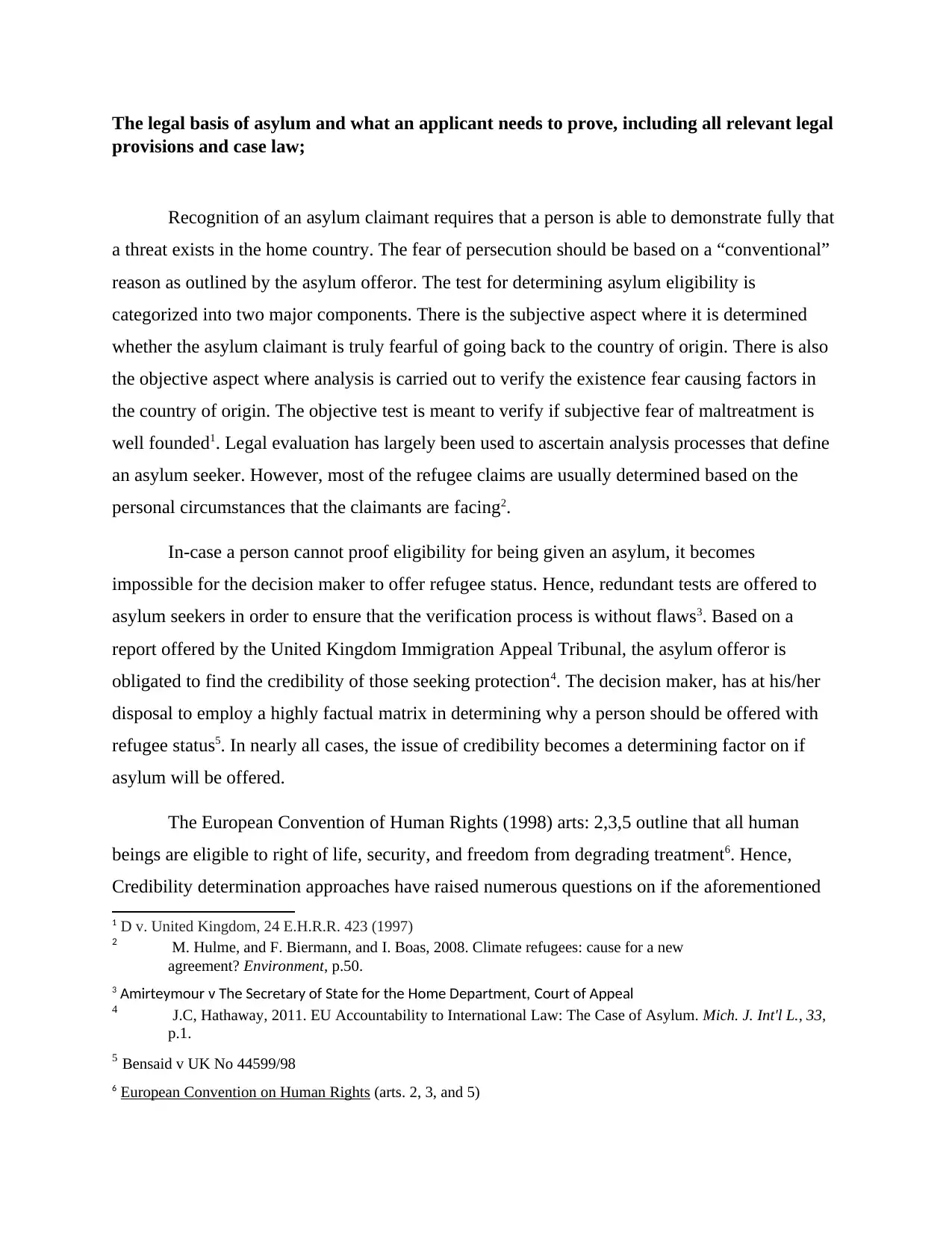
The legal basis of asylum and what an applicant needs to prove, including all relevant legal
provisions and case law;
Recognition of an asylum claimant requires that a person is able to demonstrate fully that
a threat exists in the home country. The fear of persecution should be based on a “conventional”
reason as outlined by the asylum offeror. The test for determining asylum eligibility is
categorized into two major components. There is the subjective aspect where it is determined
whether the asylum claimant is truly fearful of going back to the country of origin. There is also
the objective aspect where analysis is carried out to verify the existence fear causing factors in
the country of origin. The objective test is meant to verify if subjective fear of maltreatment is
well founded1. Legal evaluation has largely been used to ascertain analysis processes that define
an asylum seeker. However, most of the refugee claims are usually determined based on the
personal circumstances that the claimants are facing2.
In-case a person cannot proof eligibility for being given an asylum, it becomes
impossible for the decision maker to offer refugee status. Hence, redundant tests are offered to
asylum seekers in order to ensure that the verification process is without flaws3. Based on a
report offered by the United Kingdom Immigration Appeal Tribunal, the asylum offeror is
obligated to find the credibility of those seeking protection4. The decision maker, has at his/her
disposal to employ a highly factual matrix in determining why a person should be offered with
refugee status5. In nearly all cases, the issue of credibility becomes a determining factor on if
asylum will be offered.
The European Convention of Human Rights (1998) arts: 2,3,5 outline that all human
beings are eligible to right of life, security, and freedom from degrading treatment6. Hence,
Credibility determination approaches have raised numerous questions on if the aforementioned
1 D v. United Kingdom, 24 E.H.R.R. 423 (1997)
2 M. Hulme, and F. Biermann, and I. Boas, 2008. Climate refugees: cause for a new
agreement? Environment, p.50.
3 Amirteymour v The Secretary of State for the Home Department, Court of Appeal
4 J.C, Hathaway, 2011. EU Accountability to International Law: The Case of Asylum. Mich. J. Int'l L., 33,
p.1.
5 Bensaid v UK No 44599/98
6 European Convention on Human Rights (arts. 2, 3, and 5)
provisions and case law;
Recognition of an asylum claimant requires that a person is able to demonstrate fully that
a threat exists in the home country. The fear of persecution should be based on a “conventional”
reason as outlined by the asylum offeror. The test for determining asylum eligibility is
categorized into two major components. There is the subjective aspect where it is determined
whether the asylum claimant is truly fearful of going back to the country of origin. There is also
the objective aspect where analysis is carried out to verify the existence fear causing factors in
the country of origin. The objective test is meant to verify if subjective fear of maltreatment is
well founded1. Legal evaluation has largely been used to ascertain analysis processes that define
an asylum seeker. However, most of the refugee claims are usually determined based on the
personal circumstances that the claimants are facing2.
In-case a person cannot proof eligibility for being given an asylum, it becomes
impossible for the decision maker to offer refugee status. Hence, redundant tests are offered to
asylum seekers in order to ensure that the verification process is without flaws3. Based on a
report offered by the United Kingdom Immigration Appeal Tribunal, the asylum offeror is
obligated to find the credibility of those seeking protection4. The decision maker, has at his/her
disposal to employ a highly factual matrix in determining why a person should be offered with
refugee status5. In nearly all cases, the issue of credibility becomes a determining factor on if
asylum will be offered.
The European Convention of Human Rights (1998) arts: 2,3,5 outline that all human
beings are eligible to right of life, security, and freedom from degrading treatment6. Hence,
Credibility determination approaches have raised numerous questions on if the aforementioned
1 D v. United Kingdom, 24 E.H.R.R. 423 (1997)
2 M. Hulme, and F. Biermann, and I. Boas, 2008. Climate refugees: cause for a new
agreement? Environment, p.50.
3 Amirteymour v The Secretary of State for the Home Department, Court of Appeal
4 J.C, Hathaway, 2011. EU Accountability to International Law: The Case of Asylum. Mich. J. Int'l L., 33,
p.1.
5 Bensaid v UK No 44599/98
6 European Convention on Human Rights (arts. 2, 3, and 5)
Paraphrase This Document
Need a fresh take? Get an instant paraphrase of this document with our AI Paraphraser
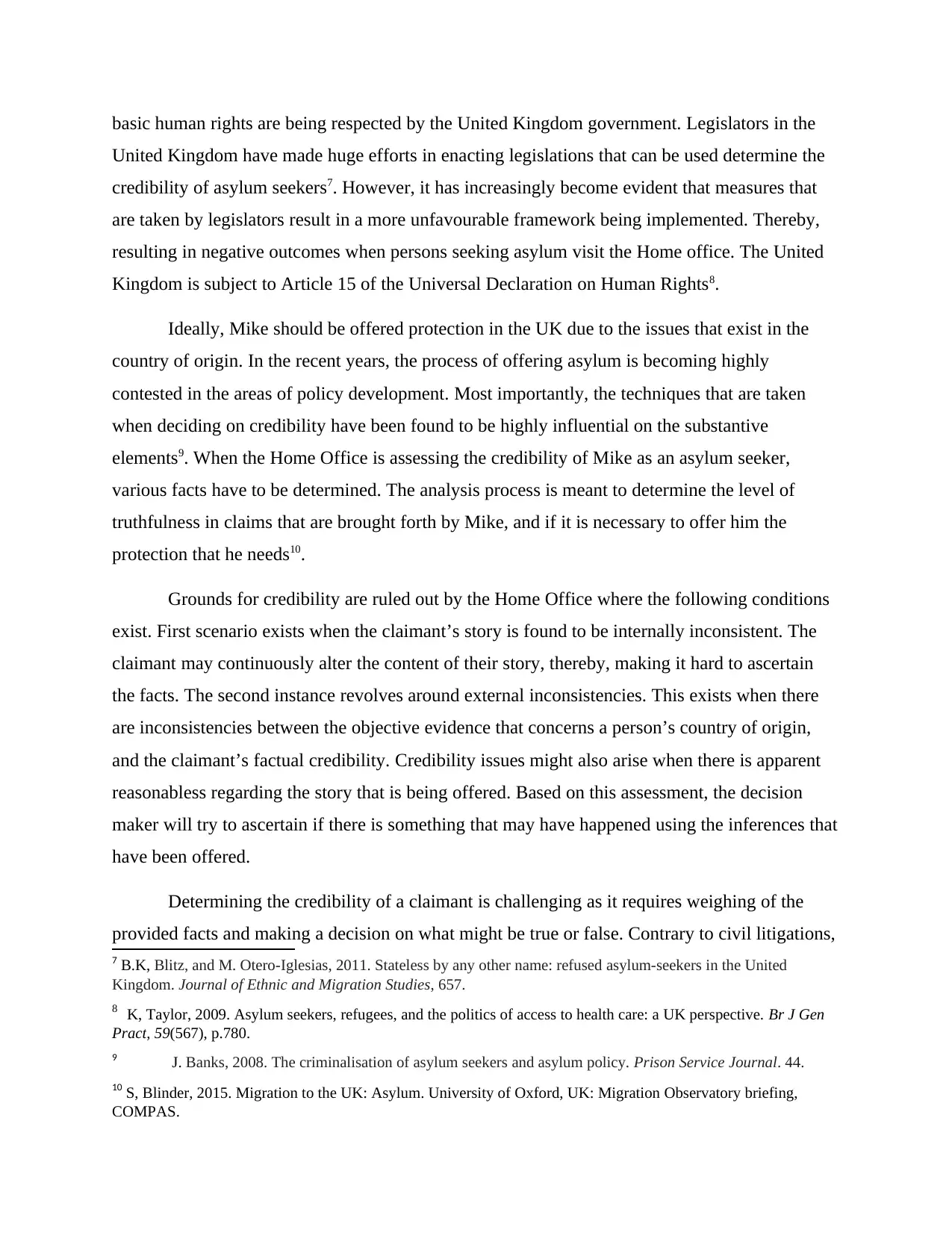
basic human rights are being respected by the United Kingdom government. Legislators in the
United Kingdom have made huge efforts in enacting legislations that can be used determine the
credibility of asylum seekers7. However, it has increasingly become evident that measures that
are taken by legislators result in a more unfavourable framework being implemented. Thereby,
resulting in negative outcomes when persons seeking asylum visit the Home office. The United
Kingdom is subject to Article 15 of the Universal Declaration on Human Rights8.
Ideally, Mike should be offered protection in the UK due to the issues that exist in the
country of origin. In the recent years, the process of offering asylum is becoming highly
contested in the areas of policy development. Most importantly, the techniques that are taken
when deciding on credibility have been found to be highly influential on the substantive
elements9. When the Home Office is assessing the credibility of Mike as an asylum seeker,
various facts have to be determined. The analysis process is meant to determine the level of
truthfulness in claims that are brought forth by Mike, and if it is necessary to offer him the
protection that he needs10.
Grounds for credibility are ruled out by the Home Office where the following conditions
exist. First scenario exists when the claimant’s story is found to be internally inconsistent. The
claimant may continuously alter the content of their story, thereby, making it hard to ascertain
the facts. The second instance revolves around external inconsistencies. This exists when there
are inconsistencies between the objective evidence that concerns a person’s country of origin,
and the claimant’s factual credibility. Credibility issues might also arise when there is apparent
reasonabless regarding the story that is being offered. Based on this assessment, the decision
maker will try to ascertain if there is something that may have happened using the inferences that
have been offered.
Determining the credibility of a claimant is challenging as it requires weighing of the
provided facts and making a decision on what might be true or false. Contrary to civil litigations,
7 B.K, Blitz, and M. Otero-Iglesias, 2011. Stateless by any other name: refused asylum-seekers in the United
Kingdom. Journal of Ethnic and Migration Studies, 657.
8 K, Taylor, 2009. Asylum seekers, refugees, and the politics of access to health care: a UK perspective. Br J Gen
Pract, 59(567), p.780.
9 J. Banks, 2008. The criminalisation of asylum seekers and asylum policy. Prison Service Journal. 44.
10 S, Blinder, 2015. Migration to the UK: Asylum. University of Oxford, UK: Migration Observatory briefing,
COMPAS.
United Kingdom have made huge efforts in enacting legislations that can be used determine the
credibility of asylum seekers7. However, it has increasingly become evident that measures that
are taken by legislators result in a more unfavourable framework being implemented. Thereby,
resulting in negative outcomes when persons seeking asylum visit the Home office. The United
Kingdom is subject to Article 15 of the Universal Declaration on Human Rights8.
Ideally, Mike should be offered protection in the UK due to the issues that exist in the
country of origin. In the recent years, the process of offering asylum is becoming highly
contested in the areas of policy development. Most importantly, the techniques that are taken
when deciding on credibility have been found to be highly influential on the substantive
elements9. When the Home Office is assessing the credibility of Mike as an asylum seeker,
various facts have to be determined. The analysis process is meant to determine the level of
truthfulness in claims that are brought forth by Mike, and if it is necessary to offer him the
protection that he needs10.
Grounds for credibility are ruled out by the Home Office where the following conditions
exist. First scenario exists when the claimant’s story is found to be internally inconsistent. The
claimant may continuously alter the content of their story, thereby, making it hard to ascertain
the facts. The second instance revolves around external inconsistencies. This exists when there
are inconsistencies between the objective evidence that concerns a person’s country of origin,
and the claimant’s factual credibility. Credibility issues might also arise when there is apparent
reasonabless regarding the story that is being offered. Based on this assessment, the decision
maker will try to ascertain if there is something that may have happened using the inferences that
have been offered.
Determining the credibility of a claimant is challenging as it requires weighing of the
provided facts and making a decision on what might be true or false. Contrary to civil litigations,
7 B.K, Blitz, and M. Otero-Iglesias, 2011. Stateless by any other name: refused asylum-seekers in the United
Kingdom. Journal of Ethnic and Migration Studies, 657.
8 K, Taylor, 2009. Asylum seekers, refugees, and the politics of access to health care: a UK perspective. Br J Gen
Pract, 59(567), p.780.
9 J. Banks, 2008. The criminalisation of asylum seekers and asylum policy. Prison Service Journal. 44.
10 S, Blinder, 2015. Migration to the UK: Asylum. University of Oxford, UK: Migration Observatory briefing,
COMPAS.
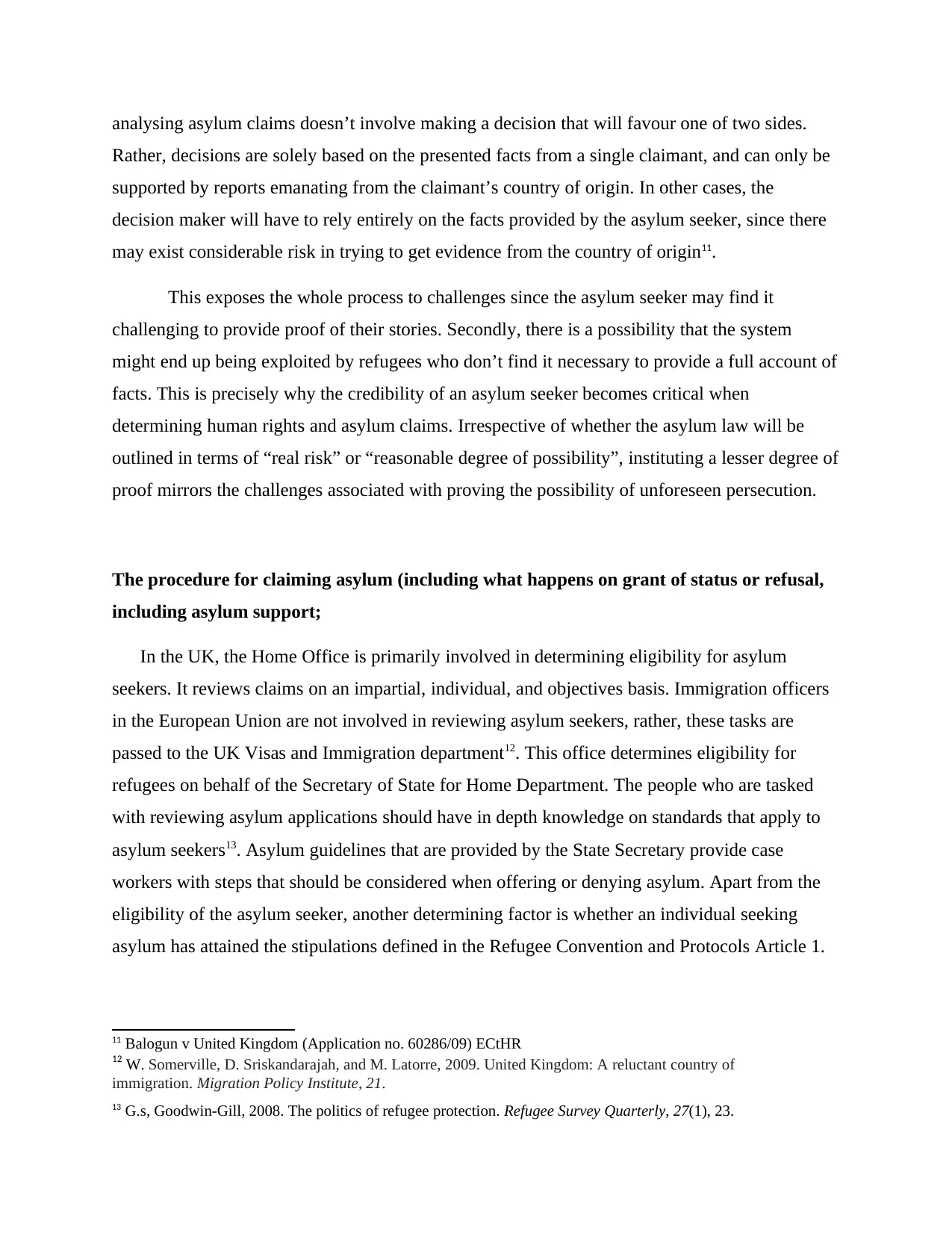
analysing asylum claims doesn’t involve making a decision that will favour one of two sides.
Rather, decisions are solely based on the presented facts from a single claimant, and can only be
supported by reports emanating from the claimant’s country of origin. In other cases, the
decision maker will have to rely entirely on the facts provided by the asylum seeker, since there
may exist considerable risk in trying to get evidence from the country of origin11.
This exposes the whole process to challenges since the asylum seeker may find it
challenging to provide proof of their stories. Secondly, there is a possibility that the system
might end up being exploited by refugees who don’t find it necessary to provide a full account of
facts. This is precisely why the credibility of an asylum seeker becomes critical when
determining human rights and asylum claims. Irrespective of whether the asylum law will be
outlined in terms of “real risk” or “reasonable degree of possibility”, instituting a lesser degree of
proof mirrors the challenges associated with proving the possibility of unforeseen persecution.
The procedure for claiming asylum (including what happens on grant of status or refusal,
including asylum support;
In the UK, the Home Office is primarily involved in determining eligibility for asylum
seekers. It reviews claims on an impartial, individual, and objectives basis. Immigration officers
in the European Union are not involved in reviewing asylum seekers, rather, these tasks are
passed to the UK Visas and Immigration department12. This office determines eligibility for
refugees on behalf of the Secretary of State for Home Department. The people who are tasked
with reviewing asylum applications should have in depth knowledge on standards that apply to
asylum seekers13. Asylum guidelines that are provided by the State Secretary provide case
workers with steps that should be considered when offering or denying asylum. Apart from the
eligibility of the asylum seeker, another determining factor is whether an individual seeking
asylum has attained the stipulations defined in the Refugee Convention and Protocols Article 1.
11 Balogun v United Kingdom (Application no. 60286/09) ECtHR
12 W. Somerville, D. Sriskandarajah, and M. Latorre, 2009. United Kingdom: A reluctant country of
immigration. Migration Policy Institute, 21.
13 G.s, Goodwin-Gill, 2008. The politics of refugee protection. Refugee Survey Quarterly, 27(1), 23.
Rather, decisions are solely based on the presented facts from a single claimant, and can only be
supported by reports emanating from the claimant’s country of origin. In other cases, the
decision maker will have to rely entirely on the facts provided by the asylum seeker, since there
may exist considerable risk in trying to get evidence from the country of origin11.
This exposes the whole process to challenges since the asylum seeker may find it
challenging to provide proof of their stories. Secondly, there is a possibility that the system
might end up being exploited by refugees who don’t find it necessary to provide a full account of
facts. This is precisely why the credibility of an asylum seeker becomes critical when
determining human rights and asylum claims. Irrespective of whether the asylum law will be
outlined in terms of “real risk” or “reasonable degree of possibility”, instituting a lesser degree of
proof mirrors the challenges associated with proving the possibility of unforeseen persecution.
The procedure for claiming asylum (including what happens on grant of status or refusal,
including asylum support;
In the UK, the Home Office is primarily involved in determining eligibility for asylum
seekers. It reviews claims on an impartial, individual, and objectives basis. Immigration officers
in the European Union are not involved in reviewing asylum seekers, rather, these tasks are
passed to the UK Visas and Immigration department12. This office determines eligibility for
refugees on behalf of the Secretary of State for Home Department. The people who are tasked
with reviewing asylum applications should have in depth knowledge on standards that apply to
asylum seekers13. Asylum guidelines that are provided by the State Secretary provide case
workers with steps that should be considered when offering or denying asylum. Apart from the
eligibility of the asylum seeker, another determining factor is whether an individual seeking
asylum has attained the stipulations defined in the Refugee Convention and Protocols Article 1.
11 Balogun v United Kingdom (Application no. 60286/09) ECtHR
12 W. Somerville, D. Sriskandarajah, and M. Latorre, 2009. United Kingdom: A reluctant country of
immigration. Migration Policy Institute, 21.
13 G.s, Goodwin-Gill, 2008. The politics of refugee protection. Refugee Survey Quarterly, 27(1), 23.
⊘ This is a preview!⊘
Do you want full access?
Subscribe today to unlock all pages.

Trusted by 1+ million students worldwide
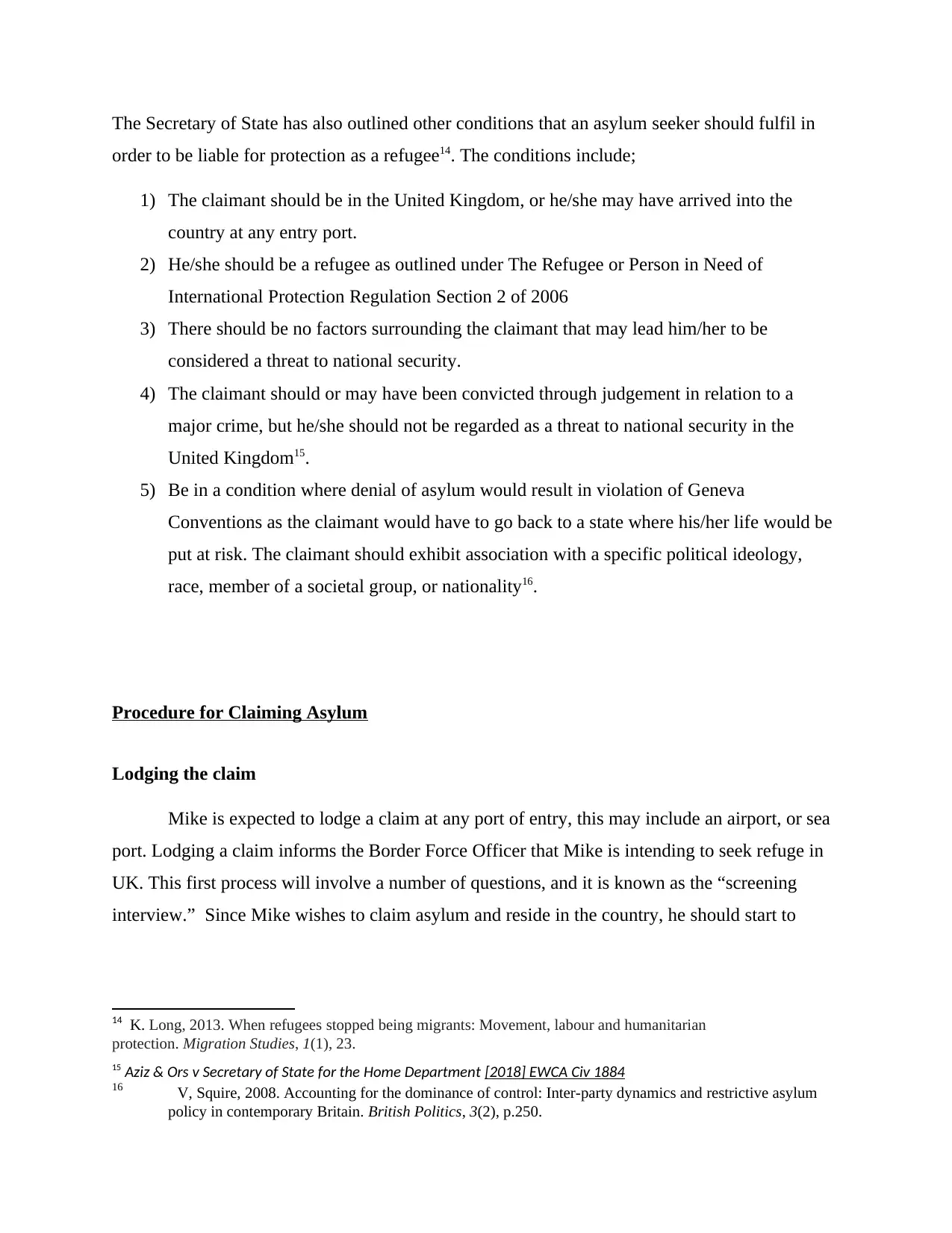
The Secretary of State has also outlined other conditions that an asylum seeker should fulfil in
order to be liable for protection as a refugee14. The conditions include;
1) The claimant should be in the United Kingdom, or he/she may have arrived into the
country at any entry port.
2) He/she should be a refugee as outlined under The Refugee or Person in Need of
International Protection Regulation Section 2 of 2006
3) There should be no factors surrounding the claimant that may lead him/her to be
considered a threat to national security.
4) The claimant should or may have been convicted through judgement in relation to a
major crime, but he/she should not be regarded as a threat to national security in the
United Kingdom15.
5) Be in a condition where denial of asylum would result in violation of Geneva
Conventions as the claimant would have to go back to a state where his/her life would be
put at risk. The claimant should exhibit association with a specific political ideology,
race, member of a societal group, or nationality16.
Procedure for Claiming Asylum
Lodging the claim
Mike is expected to lodge a claim at any port of entry, this may include an airport, or sea
port. Lodging a claim informs the Border Force Officer that Mike is intending to seek refuge in
UK. This first process will involve a number of questions, and it is known as the “screening
interview.” Since Mike wishes to claim asylum and reside in the country, he should start to
14 K. Long, 2013. When refugees stopped being migrants: Movement, labour and humanitarian
protection. Migration Studies, 1(1), 23.
15 Aziz & Ors v Secretary of State for the Home Department [2018] EWCA Civ 1884
16 V, Squire, 2008. Accounting for the dominance of control: Inter-party dynamics and restrictive asylum
policy in contemporary Britain. British Politics, 3(2), p.250.
order to be liable for protection as a refugee14. The conditions include;
1) The claimant should be in the United Kingdom, or he/she may have arrived into the
country at any entry port.
2) He/she should be a refugee as outlined under The Refugee or Person in Need of
International Protection Regulation Section 2 of 2006
3) There should be no factors surrounding the claimant that may lead him/her to be
considered a threat to national security.
4) The claimant should or may have been convicted through judgement in relation to a
major crime, but he/she should not be regarded as a threat to national security in the
United Kingdom15.
5) Be in a condition where denial of asylum would result in violation of Geneva
Conventions as the claimant would have to go back to a state where his/her life would be
put at risk. The claimant should exhibit association with a specific political ideology,
race, member of a societal group, or nationality16.
Procedure for Claiming Asylum
Lodging the claim
Mike is expected to lodge a claim at any port of entry, this may include an airport, or sea
port. Lodging a claim informs the Border Force Officer that Mike is intending to seek refuge in
UK. This first process will involve a number of questions, and it is known as the “screening
interview.” Since Mike wishes to claim asylum and reside in the country, he should start to
14 K. Long, 2013. When refugees stopped being migrants: Movement, labour and humanitarian
protection. Migration Studies, 1(1), 23.
15 Aziz & Ors v Secretary of State for the Home Department [2018] EWCA Civ 1884
16 V, Squire, 2008. Accounting for the dominance of control: Inter-party dynamics and restrictive asylum
policy in contemporary Britain. British Politics, 3(2), p.250.
Paraphrase This Document
Need a fresh take? Get an instant paraphrase of this document with our AI Paraphraser
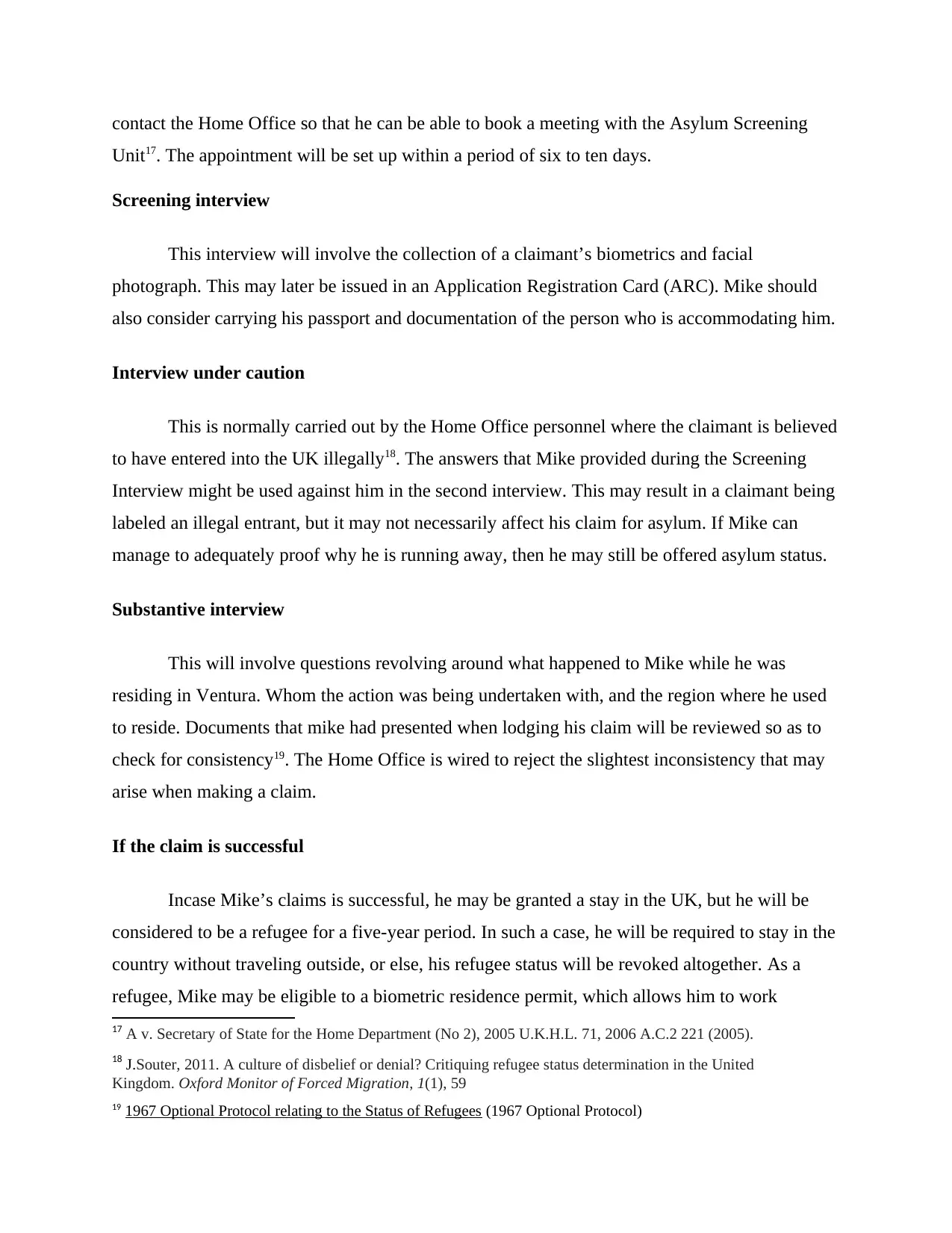
contact the Home Office so that he can be able to book a meeting with the Asylum Screening
Unit17. The appointment will be set up within a period of six to ten days.
Screening interview
This interview will involve the collection of a claimant’s biometrics and facial
photograph. This may later be issued in an Application Registration Card (ARC). Mike should
also consider carrying his passport and documentation of the person who is accommodating him.
Interview under caution
This is normally carried out by the Home Office personnel where the claimant is believed
to have entered into the UK illegally18. The answers that Mike provided during the Screening
Interview might be used against him in the second interview. This may result in a claimant being
labeled an illegal entrant, but it may not necessarily affect his claim for asylum. If Mike can
manage to adequately proof why he is running away, then he may still be offered asylum status.
Substantive interview
This will involve questions revolving around what happened to Mike while he was
residing in Ventura. Whom the action was being undertaken with, and the region where he used
to reside. Documents that mike had presented when lodging his claim will be reviewed so as to
check for consistency19. The Home Office is wired to reject the slightest inconsistency that may
arise when making a claim.
If the claim is successful
Incase Mike’s claims is successful, he may be granted a stay in the UK, but he will be
considered to be a refugee for a five-year period. In such a case, he will be required to stay in the
country without traveling outside, or else, his refugee status will be revoked altogether. As a
refugee, Mike may be eligible to a biometric residence permit, which allows him to work
17 A v. Secretary of State for the Home Department (No 2), 2005 U.K.H.L. 71, 2006 A.C.2 221 (2005).
18 J.Souter, 2011. A culture of disbelief or denial? Critiquing refugee status determination in the United
Kingdom. Oxford Monitor of Forced Migration, 1(1), 59
19 1967 Optional Protocol relating to the Status of Refugees (1967 Optional Protocol)
Unit17. The appointment will be set up within a period of six to ten days.
Screening interview
This interview will involve the collection of a claimant’s biometrics and facial
photograph. This may later be issued in an Application Registration Card (ARC). Mike should
also consider carrying his passport and documentation of the person who is accommodating him.
Interview under caution
This is normally carried out by the Home Office personnel where the claimant is believed
to have entered into the UK illegally18. The answers that Mike provided during the Screening
Interview might be used against him in the second interview. This may result in a claimant being
labeled an illegal entrant, but it may not necessarily affect his claim for asylum. If Mike can
manage to adequately proof why he is running away, then he may still be offered asylum status.
Substantive interview
This will involve questions revolving around what happened to Mike while he was
residing in Ventura. Whom the action was being undertaken with, and the region where he used
to reside. Documents that mike had presented when lodging his claim will be reviewed so as to
check for consistency19. The Home Office is wired to reject the slightest inconsistency that may
arise when making a claim.
If the claim is successful
Incase Mike’s claims is successful, he may be granted a stay in the UK, but he will be
considered to be a refugee for a five-year period. In such a case, he will be required to stay in the
country without traveling outside, or else, his refugee status will be revoked altogether. As a
refugee, Mike may be eligible to a biometric residence permit, which allows him to work
17 A v. Secretary of State for the Home Department (No 2), 2005 U.K.H.L. 71, 2006 A.C.2 221 (2005).
18 J.Souter, 2011. A culture of disbelief or denial? Critiquing refugee status determination in the United
Kingdom. Oxford Monitor of Forced Migration, 1(1), 59
19 1967 Optional Protocol relating to the Status of Refugees (1967 Optional Protocol)
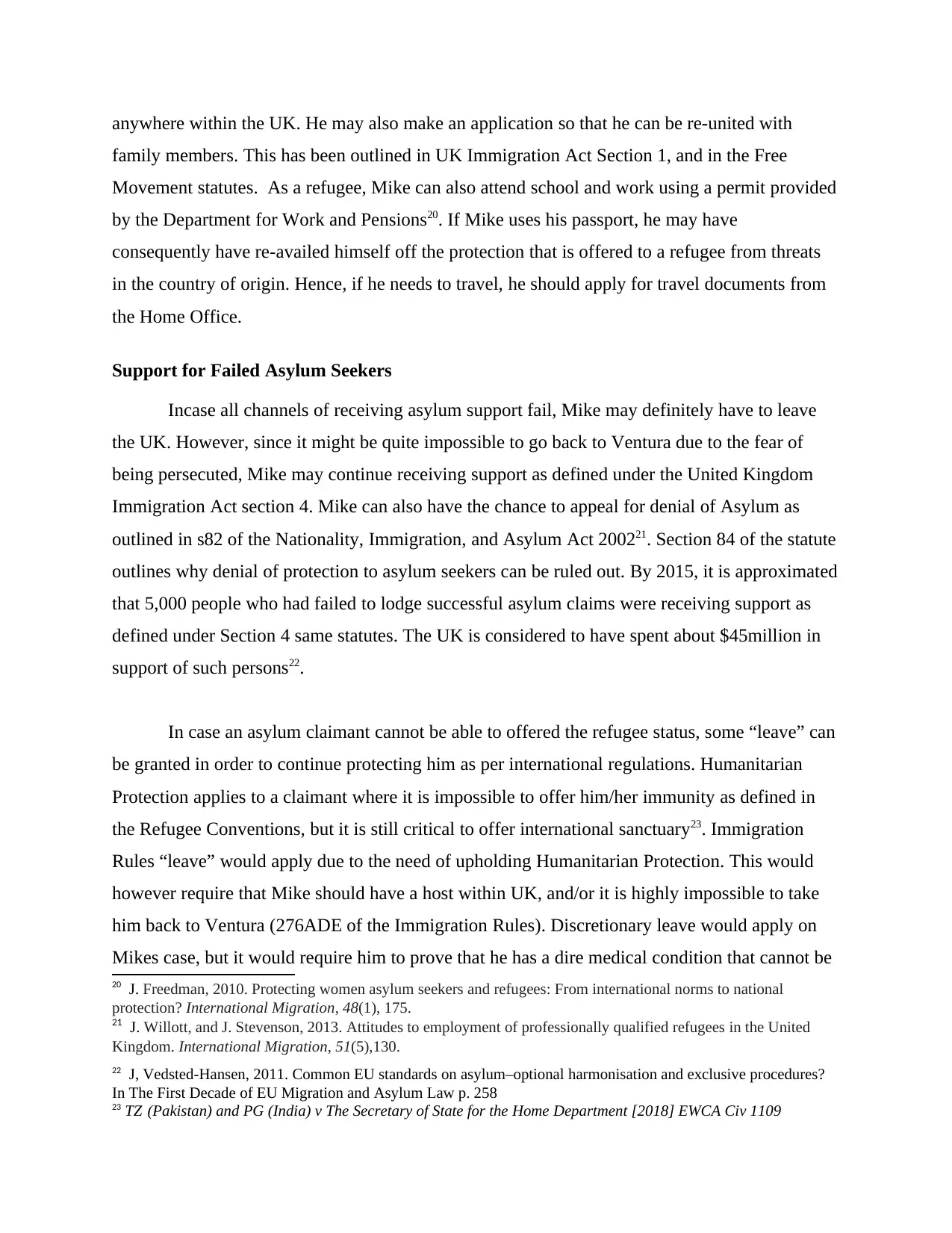
anywhere within the UK. He may also make an application so that he can be re-united with
family members. This has been outlined in UK Immigration Act Section 1, and in the Free
Movement statutes. As a refugee, Mike can also attend school and work using a permit provided
by the Department for Work and Pensions20. If Mike uses his passport, he may have
consequently have re-availed himself off the protection that is offered to a refugee from threats
in the country of origin. Hence, if he needs to travel, he should apply for travel documents from
the Home Office.
Support for Failed Asylum Seekers
Incase all channels of receiving asylum support fail, Mike may definitely have to leave
the UK. However, since it might be quite impossible to go back to Ventura due to the fear of
being persecuted, Mike may continue receiving support as defined under the United Kingdom
Immigration Act section 4. Mike can also have the chance to appeal for denial of Asylum as
outlined in s82 of the Nationality, Immigration, and Asylum Act 200221. Section 84 of the statute
outlines why denial of protection to asylum seekers can be ruled out. By 2015, it is approximated
that 5,000 people who had failed to lodge successful asylum claims were receiving support as
defined under Section 4 same statutes. The UK is considered to have spent about $45million in
support of such persons22.
In case an asylum claimant cannot be able to offered the refugee status, some “leave” can
be granted in order to continue protecting him as per international regulations. Humanitarian
Protection applies to a claimant where it is impossible to offer him/her immunity as defined in
the Refugee Conventions, but it is still critical to offer international sanctuary23. Immigration
Rules “leave” would apply due to the need of upholding Humanitarian Protection. This would
however require that Mike should have a host within UK, and/or it is highly impossible to take
him back to Ventura (276ADE of the Immigration Rules). Discretionary leave would apply on
Mikes case, but it would require him to prove that he has a dire medical condition that cannot be
20 J. Freedman, 2010. Protecting women asylum seekers and refugees: From international norms to national
protection? International Migration, 48(1), 175.
21 J. Willott, and J. Stevenson, 2013. Attitudes to employment of professionally qualified refugees in the United
Kingdom. International Migration, 51(5),130.
22 J, Vedsted-Hansen, 2011. Common EU standards on asylum–optional harmonisation and exclusive procedures?
In The First Decade of EU Migration and Asylum Law p. 258
23 TZ (Pakistan) and PG (India) v The Secretary of State for the Home Department [2018] EWCA Civ 1109
family members. This has been outlined in UK Immigration Act Section 1, and in the Free
Movement statutes. As a refugee, Mike can also attend school and work using a permit provided
by the Department for Work and Pensions20. If Mike uses his passport, he may have
consequently have re-availed himself off the protection that is offered to a refugee from threats
in the country of origin. Hence, if he needs to travel, he should apply for travel documents from
the Home Office.
Support for Failed Asylum Seekers
Incase all channels of receiving asylum support fail, Mike may definitely have to leave
the UK. However, since it might be quite impossible to go back to Ventura due to the fear of
being persecuted, Mike may continue receiving support as defined under the United Kingdom
Immigration Act section 4. Mike can also have the chance to appeal for denial of Asylum as
outlined in s82 of the Nationality, Immigration, and Asylum Act 200221. Section 84 of the statute
outlines why denial of protection to asylum seekers can be ruled out. By 2015, it is approximated
that 5,000 people who had failed to lodge successful asylum claims were receiving support as
defined under Section 4 same statutes. The UK is considered to have spent about $45million in
support of such persons22.
In case an asylum claimant cannot be able to offered the refugee status, some “leave” can
be granted in order to continue protecting him as per international regulations. Humanitarian
Protection applies to a claimant where it is impossible to offer him/her immunity as defined in
the Refugee Conventions, but it is still critical to offer international sanctuary23. Immigration
Rules “leave” would apply due to the need of upholding Humanitarian Protection. This would
however require that Mike should have a host within UK, and/or it is highly impossible to take
him back to Ventura (276ADE of the Immigration Rules). Discretionary leave would apply on
Mikes case, but it would require him to prove that he has a dire medical condition that cannot be
20 J. Freedman, 2010. Protecting women asylum seekers and refugees: From international norms to national
protection? International Migration, 48(1), 175.
21 J. Willott, and J. Stevenson, 2013. Attitudes to employment of professionally qualified refugees in the United
Kingdom. International Migration, 51(5),130.
22 J, Vedsted-Hansen, 2011. Common EU standards on asylum–optional harmonisation and exclusive procedures?
In The First Decade of EU Migration and Asylum Law p. 258
23 TZ (Pakistan) and PG (India) v The Secretary of State for the Home Department [2018] EWCA Civ 1109
⊘ This is a preview!⊘
Do you want full access?
Subscribe today to unlock all pages.

Trusted by 1+ million students worldwide
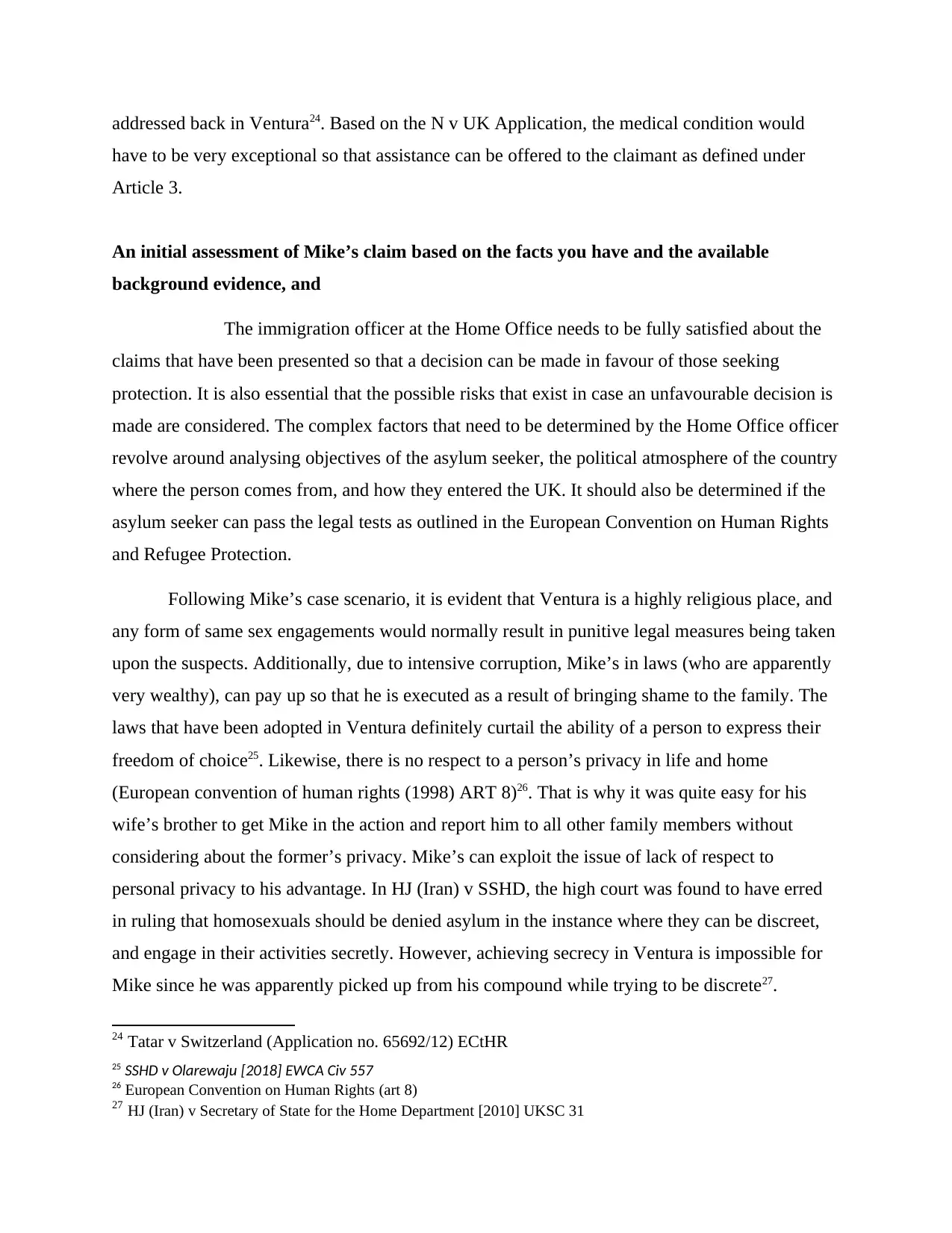
addressed back in Ventura24. Based on the N v UK Application, the medical condition would
have to be very exceptional so that assistance can be offered to the claimant as defined under
Article 3.
An initial assessment of Mike’s claim based on the facts you have and the available
background evidence, and
The immigration officer at the Home Office needs to be fully satisfied about the
claims that have been presented so that a decision can be made in favour of those seeking
protection. It is also essential that the possible risks that exist in case an unfavourable decision is
made are considered. The complex factors that need to be determined by the Home Office officer
revolve around analysing objectives of the asylum seeker, the political atmosphere of the country
where the person comes from, and how they entered the UK. It should also be determined if the
asylum seeker can pass the legal tests as outlined in the European Convention on Human Rights
and Refugee Protection.
Following Mike’s case scenario, it is evident that Ventura is a highly religious place, and
any form of same sex engagements would normally result in punitive legal measures being taken
upon the suspects. Additionally, due to intensive corruption, Mike’s in laws (who are apparently
very wealthy), can pay up so that he is executed as a result of bringing shame to the family. The
laws that have been adopted in Ventura definitely curtail the ability of a person to express their
freedom of choice25. Likewise, there is no respect to a person’s privacy in life and home
(European convention of human rights (1998) ART 8)26. That is why it was quite easy for his
wife’s brother to get Mike in the action and report him to all other family members without
considering about the former’s privacy. Mike’s can exploit the issue of lack of respect to
personal privacy to his advantage. In HJ (Iran) v SSHD, the high court was found to have erred
in ruling that homosexuals should be denied asylum in the instance where they can be discreet,
and engage in their activities secretly. However, achieving secrecy in Ventura is impossible for
Mike since he was apparently picked up from his compound while trying to be discrete27.
24 Tatar v Switzerland (Application no. 65692/12) ECtHR
25 SSHD v Olarewaju [2018] EWCA Civ 557
26 European Convention on Human Rights (art 8)
27 HJ (Iran) v Secretary of State for the Home Department [2010] UKSC 31
have to be very exceptional so that assistance can be offered to the claimant as defined under
Article 3.
An initial assessment of Mike’s claim based on the facts you have and the available
background evidence, and
The immigration officer at the Home Office needs to be fully satisfied about the
claims that have been presented so that a decision can be made in favour of those seeking
protection. It is also essential that the possible risks that exist in case an unfavourable decision is
made are considered. The complex factors that need to be determined by the Home Office officer
revolve around analysing objectives of the asylum seeker, the political atmosphere of the country
where the person comes from, and how they entered the UK. It should also be determined if the
asylum seeker can pass the legal tests as outlined in the European Convention on Human Rights
and Refugee Protection.
Following Mike’s case scenario, it is evident that Ventura is a highly religious place, and
any form of same sex engagements would normally result in punitive legal measures being taken
upon the suspects. Additionally, due to intensive corruption, Mike’s in laws (who are apparently
very wealthy), can pay up so that he is executed as a result of bringing shame to the family. The
laws that have been adopted in Ventura definitely curtail the ability of a person to express their
freedom of choice25. Likewise, there is no respect to a person’s privacy in life and home
(European convention of human rights (1998) ART 8)26. That is why it was quite easy for his
wife’s brother to get Mike in the action and report him to all other family members without
considering about the former’s privacy. Mike’s can exploit the issue of lack of respect to
personal privacy to his advantage. In HJ (Iran) v SSHD, the high court was found to have erred
in ruling that homosexuals should be denied asylum in the instance where they can be discreet,
and engage in their activities secretly. However, achieving secrecy in Ventura is impossible for
Mike since he was apparently picked up from his compound while trying to be discrete27.
24 Tatar v Switzerland (Application no. 65692/12) ECtHR
25 SSHD v Olarewaju [2018] EWCA Civ 557
26 European Convention on Human Rights (art 8)
27 HJ (Iran) v Secretary of State for the Home Department [2010] UKSC 31
Paraphrase This Document
Need a fresh take? Get an instant paraphrase of this document with our AI Paraphraser
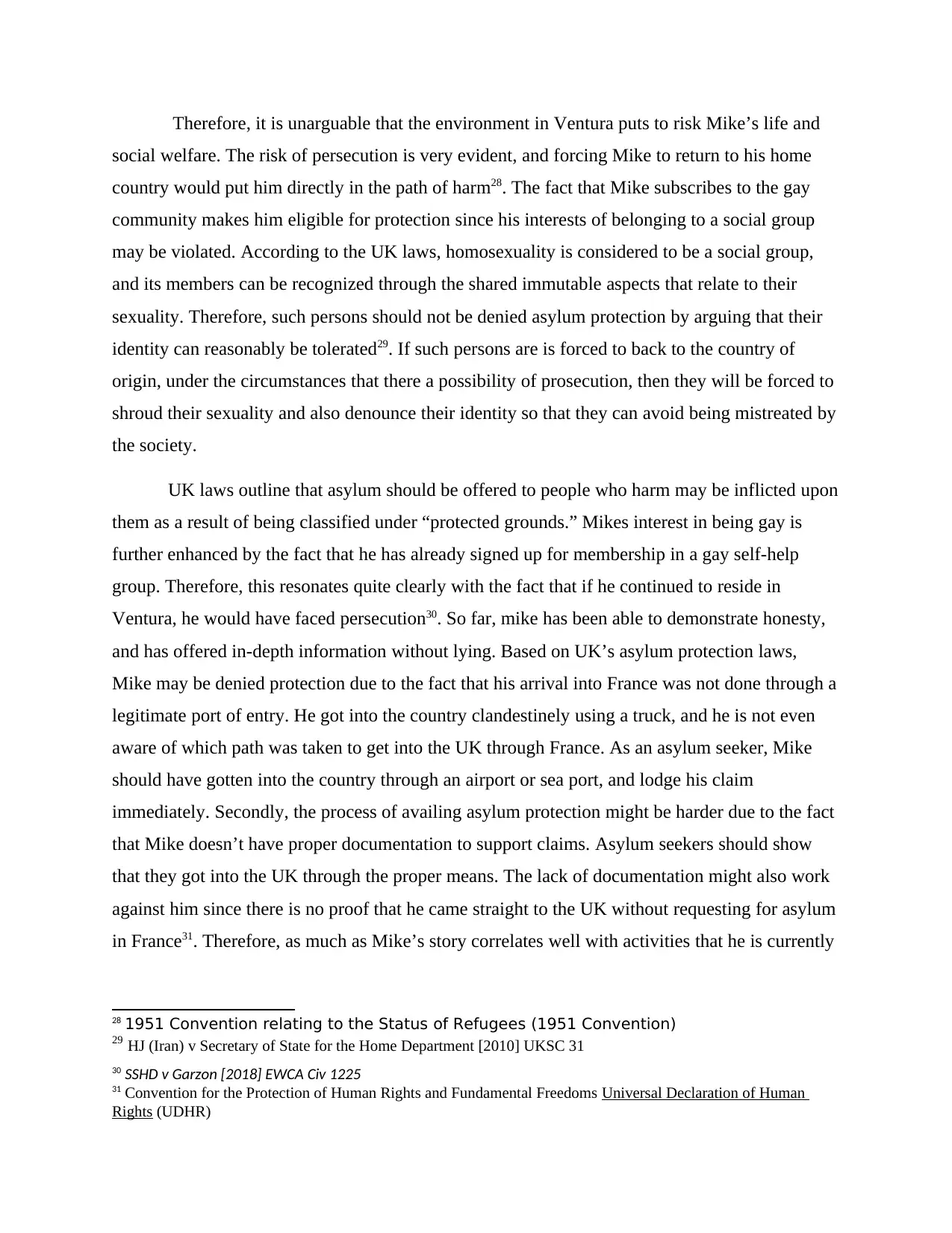
Therefore, it is unarguable that the environment in Ventura puts to risk Mike’s life and
social welfare. The risk of persecution is very evident, and forcing Mike to return to his home
country would put him directly in the path of harm28. The fact that Mike subscribes to the gay
community makes him eligible for protection since his interests of belonging to a social group
may be violated. According to the UK laws, homosexuality is considered to be a social group,
and its members can be recognized through the shared immutable aspects that relate to their
sexuality. Therefore, such persons should not be denied asylum protection by arguing that their
identity can reasonably be tolerated29. If such persons are is forced to back to the country of
origin, under the circumstances that there a possibility of prosecution, then they will be forced to
shroud their sexuality and also denounce their identity so that they can avoid being mistreated by
the society.
UK laws outline that asylum should be offered to people who harm may be inflicted upon
them as a result of being classified under “protected grounds.” Mikes interest in being gay is
further enhanced by the fact that he has already signed up for membership in a gay self-help
group. Therefore, this resonates quite clearly with the fact that if he continued to reside in
Ventura, he would have faced persecution30. So far, mike has been able to demonstrate honesty,
and has offered in-depth information without lying. Based on UK’s asylum protection laws,
Mike may be denied protection due to the fact that his arrival into France was not done through a
legitimate port of entry. He got into the country clandestinely using a truck, and he is not even
aware of which path was taken to get into the UK through France. As an asylum seeker, Mike
should have gotten into the country through an airport or sea port, and lodge his claim
immediately. Secondly, the process of availing asylum protection might be harder due to the fact
that Mike doesn’t have proper documentation to support claims. Asylum seekers should show
that they got into the UK through the proper means. The lack of documentation might also work
against him since there is no proof that he came straight to the UK without requesting for asylum
in France31. Therefore, as much as Mike’s story correlates well with activities that he is currently
28 1951 Convention relating to the Status of Refugees (1951 Convention)
29 HJ (Iran) v Secretary of State for the Home Department [2010] UKSC 31
30 SSHD v Garzon [2018] EWCA Civ 1225
31 Convention for the Protection of Human Rights and Fundamental Freedoms Universal Declaration of Human
Rights (UDHR)
social welfare. The risk of persecution is very evident, and forcing Mike to return to his home
country would put him directly in the path of harm28. The fact that Mike subscribes to the gay
community makes him eligible for protection since his interests of belonging to a social group
may be violated. According to the UK laws, homosexuality is considered to be a social group,
and its members can be recognized through the shared immutable aspects that relate to their
sexuality. Therefore, such persons should not be denied asylum protection by arguing that their
identity can reasonably be tolerated29. If such persons are is forced to back to the country of
origin, under the circumstances that there a possibility of prosecution, then they will be forced to
shroud their sexuality and also denounce their identity so that they can avoid being mistreated by
the society.
UK laws outline that asylum should be offered to people who harm may be inflicted upon
them as a result of being classified under “protected grounds.” Mikes interest in being gay is
further enhanced by the fact that he has already signed up for membership in a gay self-help
group. Therefore, this resonates quite clearly with the fact that if he continued to reside in
Ventura, he would have faced persecution30. So far, mike has been able to demonstrate honesty,
and has offered in-depth information without lying. Based on UK’s asylum protection laws,
Mike may be denied protection due to the fact that his arrival into France was not done through a
legitimate port of entry. He got into the country clandestinely using a truck, and he is not even
aware of which path was taken to get into the UK through France. As an asylum seeker, Mike
should have gotten into the country through an airport or sea port, and lodge his claim
immediately. Secondly, the process of availing asylum protection might be harder due to the fact
that Mike doesn’t have proper documentation to support claims. Asylum seekers should show
that they got into the UK through the proper means. The lack of documentation might also work
against him since there is no proof that he came straight to the UK without requesting for asylum
in France31. Therefore, as much as Mike’s story correlates well with activities that he is currently
28 1951 Convention relating to the Status of Refugees (1951 Convention)
29 HJ (Iran) v Secretary of State for the Home Department [2010] UKSC 31
30 SSHD v Garzon [2018] EWCA Civ 1225
31 Convention for the Protection of Human Rights and Fundamental Freedoms Universal Declaration of Human
Rights (UDHR)
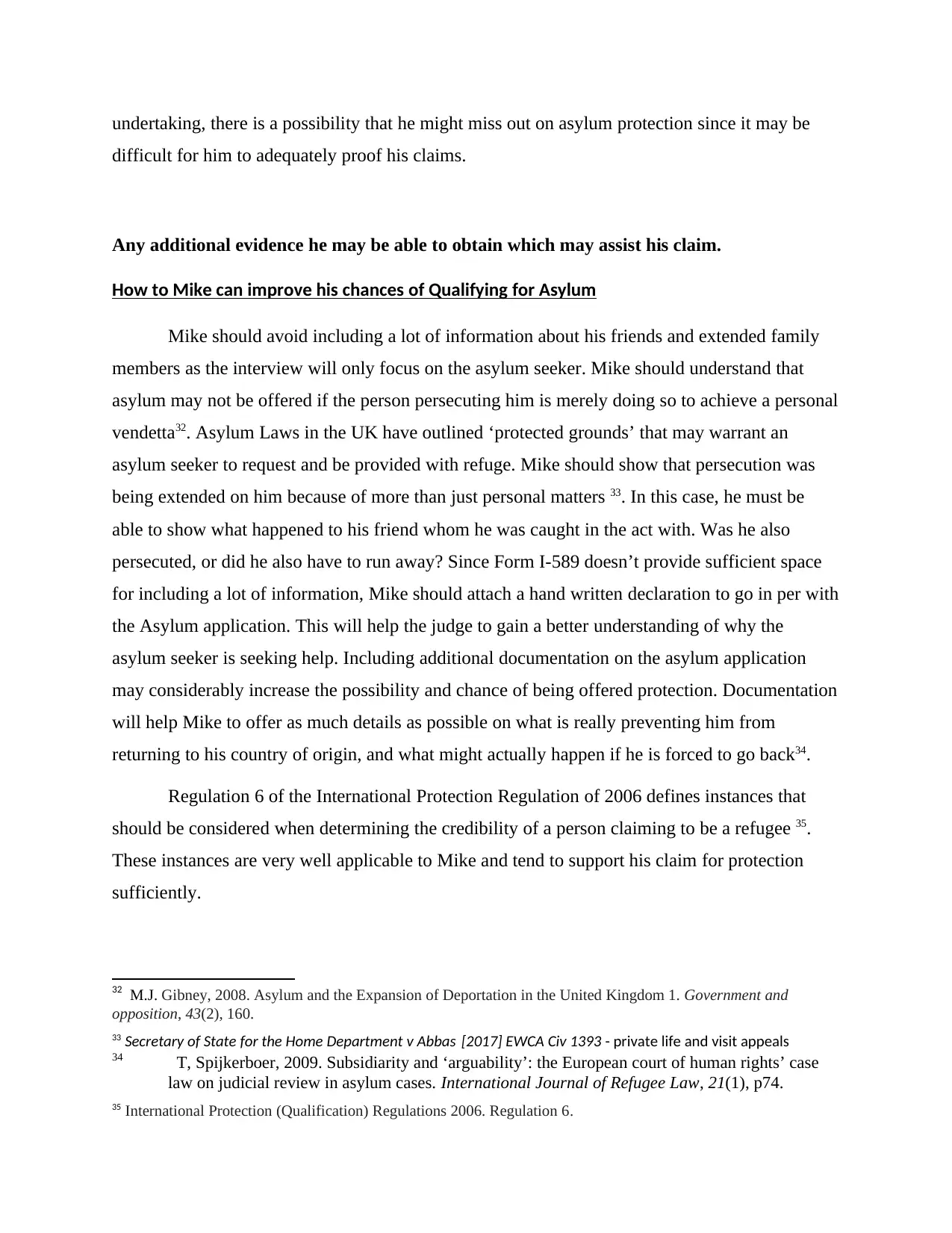
undertaking, there is a possibility that he might miss out on asylum protection since it may be
difficult for him to adequately proof his claims.
Any additional evidence he may be able to obtain which may assist his claim.
How to Mike can improve his chances of Qualifying for Asylum
Mike should avoid including a lot of information about his friends and extended family
members as the interview will only focus on the asylum seeker. Mike should understand that
asylum may not be offered if the person persecuting him is merely doing so to achieve a personal
vendetta32. Asylum Laws in the UK have outlined ‘protected grounds’ that may warrant an
asylum seeker to request and be provided with refuge. Mike should show that persecution was
being extended on him because of more than just personal matters 33. In this case, he must be
able to show what happened to his friend whom he was caught in the act with. Was he also
persecuted, or did he also have to run away? Since Form I-589 doesn’t provide sufficient space
for including a lot of information, Mike should attach a hand written declaration to go in per with
the Asylum application. This will help the judge to gain a better understanding of why the
asylum seeker is seeking help. Including additional documentation on the asylum application
may considerably increase the possibility and chance of being offered protection. Documentation
will help Mike to offer as much details as possible on what is really preventing him from
returning to his country of origin, and what might actually happen if he is forced to go back34.
Regulation 6 of the International Protection Regulation of 2006 defines instances that
should be considered when determining the credibility of a person claiming to be a refugee 35.
These instances are very well applicable to Mike and tend to support his claim for protection
sufficiently.
32 M.J. Gibney, 2008. Asylum and the Expansion of Deportation in the United Kingdom 1. Government and
opposition, 43(2), 160.
33 Secretary of State for the Home Department v Abbas [2017] EWCA Civ 1393 - private life and visit appeals
34 T, Spijkerboer, 2009. Subsidiarity and ‘arguability’: the European court of human rights’ case
law on judicial review in asylum cases. International Journal of Refugee Law, 21(1), p74.
35 International Protection (Qualification) Regulations 2006. Regulation 6.
difficult for him to adequately proof his claims.
Any additional evidence he may be able to obtain which may assist his claim.
How to Mike can improve his chances of Qualifying for Asylum
Mike should avoid including a lot of information about his friends and extended family
members as the interview will only focus on the asylum seeker. Mike should understand that
asylum may not be offered if the person persecuting him is merely doing so to achieve a personal
vendetta32. Asylum Laws in the UK have outlined ‘protected grounds’ that may warrant an
asylum seeker to request and be provided with refuge. Mike should show that persecution was
being extended on him because of more than just personal matters 33. In this case, he must be
able to show what happened to his friend whom he was caught in the act with. Was he also
persecuted, or did he also have to run away? Since Form I-589 doesn’t provide sufficient space
for including a lot of information, Mike should attach a hand written declaration to go in per with
the Asylum application. This will help the judge to gain a better understanding of why the
asylum seeker is seeking help. Including additional documentation on the asylum application
may considerably increase the possibility and chance of being offered protection. Documentation
will help Mike to offer as much details as possible on what is really preventing him from
returning to his country of origin, and what might actually happen if he is forced to go back34.
Regulation 6 of the International Protection Regulation of 2006 defines instances that
should be considered when determining the credibility of a person claiming to be a refugee 35.
These instances are very well applicable to Mike and tend to support his claim for protection
sufficiently.
32 M.J. Gibney, 2008. Asylum and the Expansion of Deportation in the United Kingdom 1. Government and
opposition, 43(2), 160.
33 Secretary of State for the Home Department v Abbas [2017] EWCA Civ 1393 - private life and visit appeals
34 T, Spijkerboer, 2009. Subsidiarity and ‘arguability’: the European court of human rights’ case
law on judicial review in asylum cases. International Journal of Refugee Law, 21(1), p74.
35 International Protection (Qualification) Regulations 2006. Regulation 6.
⊘ This is a preview!⊘
Do you want full access?
Subscribe today to unlock all pages.

Trusted by 1+ million students worldwide
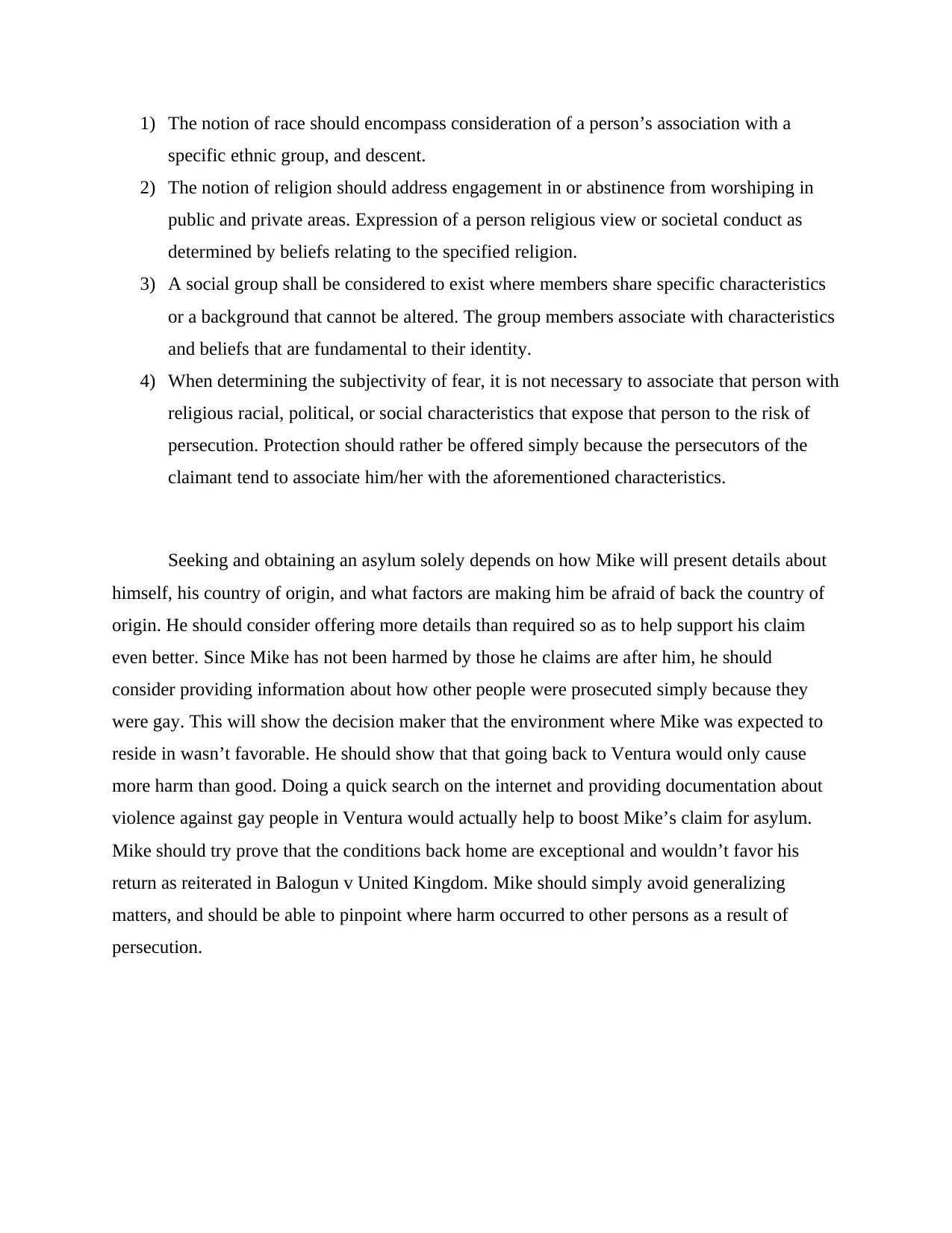
1) The notion of race should encompass consideration of a person’s association with a
specific ethnic group, and descent.
2) The notion of religion should address engagement in or abstinence from worshiping in
public and private areas. Expression of a person religious view or societal conduct as
determined by beliefs relating to the specified religion.
3) A social group shall be considered to exist where members share specific characteristics
or a background that cannot be altered. The group members associate with characteristics
and beliefs that are fundamental to their identity.
4) When determining the subjectivity of fear, it is not necessary to associate that person with
religious racial, political, or social characteristics that expose that person to the risk of
persecution. Protection should rather be offered simply because the persecutors of the
claimant tend to associate him/her with the aforementioned characteristics.
Seeking and obtaining an asylum solely depends on how Mike will present details about
himself, his country of origin, and what factors are making him be afraid of back the country of
origin. He should consider offering more details than required so as to help support his claim
even better. Since Mike has not been harmed by those he claims are after him, he should
consider providing information about how other people were prosecuted simply because they
were gay. This will show the decision maker that the environment where Mike was expected to
reside in wasn’t favorable. He should show that that going back to Ventura would only cause
more harm than good. Doing a quick search on the internet and providing documentation about
violence against gay people in Ventura would actually help to boost Mike’s claim for asylum.
Mike should try prove that the conditions back home are exceptional and wouldn’t favor his
return as reiterated in Balogun v United Kingdom. Mike should simply avoid generalizing
matters, and should be able to pinpoint where harm occurred to other persons as a result of
persecution.
specific ethnic group, and descent.
2) The notion of religion should address engagement in or abstinence from worshiping in
public and private areas. Expression of a person religious view or societal conduct as
determined by beliefs relating to the specified religion.
3) A social group shall be considered to exist where members share specific characteristics
or a background that cannot be altered. The group members associate with characteristics
and beliefs that are fundamental to their identity.
4) When determining the subjectivity of fear, it is not necessary to associate that person with
religious racial, political, or social characteristics that expose that person to the risk of
persecution. Protection should rather be offered simply because the persecutors of the
claimant tend to associate him/her with the aforementioned characteristics.
Seeking and obtaining an asylum solely depends on how Mike will present details about
himself, his country of origin, and what factors are making him be afraid of back the country of
origin. He should consider offering more details than required so as to help support his claim
even better. Since Mike has not been harmed by those he claims are after him, he should
consider providing information about how other people were prosecuted simply because they
were gay. This will show the decision maker that the environment where Mike was expected to
reside in wasn’t favorable. He should show that that going back to Ventura would only cause
more harm than good. Doing a quick search on the internet and providing documentation about
violence against gay people in Ventura would actually help to boost Mike’s claim for asylum.
Mike should try prove that the conditions back home are exceptional and wouldn’t favor his
return as reiterated in Balogun v United Kingdom. Mike should simply avoid generalizing
matters, and should be able to pinpoint where harm occurred to other persons as a result of
persecution.
Paraphrase This Document
Need a fresh take? Get an instant paraphrase of this document with our AI Paraphraser
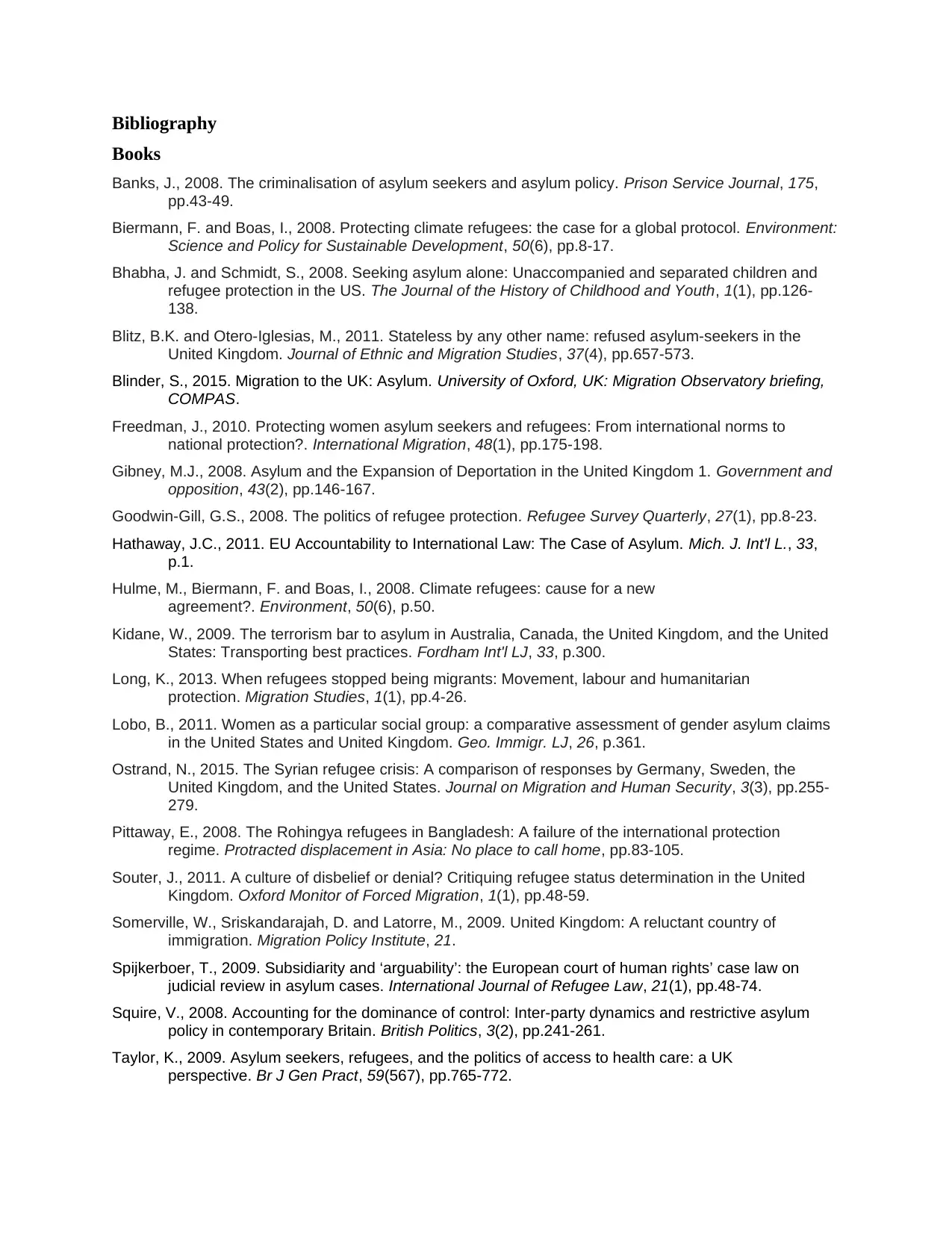
Bibliography
Books
Banks, J., 2008. The criminalisation of asylum seekers and asylum policy. Prison Service Journal, 175,
pp.43-49.
Biermann, F. and Boas, I., 2008. Protecting climate refugees: the case for a global protocol. Environment:
Science and Policy for Sustainable Development, 50(6), pp.8-17.
Bhabha, J. and Schmidt, S., 2008. Seeking asylum alone: Unaccompanied and separated children and
refugee protection in the US. The Journal of the History of Childhood and Youth, 1(1), pp.126-
138.
Blitz, B.K. and Otero-Iglesias, M., 2011. Stateless by any other name: refused asylum-seekers in the
United Kingdom. Journal of Ethnic and Migration Studies, 37(4), pp.657-573.
Blinder, S., 2015. Migration to the UK: Asylum. University of Oxford, UK: Migration Observatory briefing,
COMPAS.
Freedman, J., 2010. Protecting women asylum seekers and refugees: From international norms to
national protection?. International Migration, 48(1), pp.175-198.
Gibney, M.J., 2008. Asylum and the Expansion of Deportation in the United Kingdom 1. Government and
opposition, 43(2), pp.146-167.
Goodwin-Gill, G.S., 2008. The politics of refugee protection. Refugee Survey Quarterly, 27(1), pp.8-23.
Hathaway, J.C., 2011. EU Accountability to International Law: The Case of Asylum. Mich. J. Int'l L., 33,
p.1.
Hulme, M., Biermann, F. and Boas, I., 2008. Climate refugees: cause for a new
agreement?. Environment, 50(6), p.50.
Kidane, W., 2009. The terrorism bar to asylum in Australia, Canada, the United Kingdom, and the United
States: Transporting best practices. Fordham Int'l LJ, 33, p.300.
Long, K., 2013. When refugees stopped being migrants: Movement, labour and humanitarian
protection. Migration Studies, 1(1), pp.4-26.
Lobo, B., 2011. Women as a particular social group: a comparative assessment of gender asylum claims
in the United States and United Kingdom. Geo. Immigr. LJ, 26, p.361.
Ostrand, N., 2015. The Syrian refugee crisis: A comparison of responses by Germany, Sweden, the
United Kingdom, and the United States. Journal on Migration and Human Security, 3(3), pp.255-
279.
Pittaway, E., 2008. The Rohingya refugees in Bangladesh: A failure of the international protection
regime. Protracted displacement in Asia: No place to call home, pp.83-105.
Souter, J., 2011. A culture of disbelief or denial? Critiquing refugee status determination in the United
Kingdom. Oxford Monitor of Forced Migration, 1(1), pp.48-59.
Somerville, W., Sriskandarajah, D. and Latorre, M., 2009. United Kingdom: A reluctant country of
immigration. Migration Policy Institute, 21.
Spijkerboer, T., 2009. Subsidiarity and ‘arguability’: the European court of human rights’ case law on
judicial review in asylum cases. International Journal of Refugee Law, 21(1), pp.48-74.
Squire, V., 2008. Accounting for the dominance of control: Inter-party dynamics and restrictive asylum
policy in contemporary Britain. British Politics, 3(2), pp.241-261.
Taylor, K., 2009. Asylum seekers, refugees, and the politics of access to health care: a UK
perspective. Br J Gen Pract, 59(567), pp.765-772.
Books
Banks, J., 2008. The criminalisation of asylum seekers and asylum policy. Prison Service Journal, 175,
pp.43-49.
Biermann, F. and Boas, I., 2008. Protecting climate refugees: the case for a global protocol. Environment:
Science and Policy for Sustainable Development, 50(6), pp.8-17.
Bhabha, J. and Schmidt, S., 2008. Seeking asylum alone: Unaccompanied and separated children and
refugee protection in the US. The Journal of the History of Childhood and Youth, 1(1), pp.126-
138.
Blitz, B.K. and Otero-Iglesias, M., 2011. Stateless by any other name: refused asylum-seekers in the
United Kingdom. Journal of Ethnic and Migration Studies, 37(4), pp.657-573.
Blinder, S., 2015. Migration to the UK: Asylum. University of Oxford, UK: Migration Observatory briefing,
COMPAS.
Freedman, J., 2010. Protecting women asylum seekers and refugees: From international norms to
national protection?. International Migration, 48(1), pp.175-198.
Gibney, M.J., 2008. Asylum and the Expansion of Deportation in the United Kingdom 1. Government and
opposition, 43(2), pp.146-167.
Goodwin-Gill, G.S., 2008. The politics of refugee protection. Refugee Survey Quarterly, 27(1), pp.8-23.
Hathaway, J.C., 2011. EU Accountability to International Law: The Case of Asylum. Mich. J. Int'l L., 33,
p.1.
Hulme, M., Biermann, F. and Boas, I., 2008. Climate refugees: cause for a new
agreement?. Environment, 50(6), p.50.
Kidane, W., 2009. The terrorism bar to asylum in Australia, Canada, the United Kingdom, and the United
States: Transporting best practices. Fordham Int'l LJ, 33, p.300.
Long, K., 2013. When refugees stopped being migrants: Movement, labour and humanitarian
protection. Migration Studies, 1(1), pp.4-26.
Lobo, B., 2011. Women as a particular social group: a comparative assessment of gender asylum claims
in the United States and United Kingdom. Geo. Immigr. LJ, 26, p.361.
Ostrand, N., 2015. The Syrian refugee crisis: A comparison of responses by Germany, Sweden, the
United Kingdom, and the United States. Journal on Migration and Human Security, 3(3), pp.255-
279.
Pittaway, E., 2008. The Rohingya refugees in Bangladesh: A failure of the international protection
regime. Protracted displacement in Asia: No place to call home, pp.83-105.
Souter, J., 2011. A culture of disbelief or denial? Critiquing refugee status determination in the United
Kingdom. Oxford Monitor of Forced Migration, 1(1), pp.48-59.
Somerville, W., Sriskandarajah, D. and Latorre, M., 2009. United Kingdom: A reluctant country of
immigration. Migration Policy Institute, 21.
Spijkerboer, T., 2009. Subsidiarity and ‘arguability’: the European court of human rights’ case law on
judicial review in asylum cases. International Journal of Refugee Law, 21(1), pp.48-74.
Squire, V., 2008. Accounting for the dominance of control: Inter-party dynamics and restrictive asylum
policy in contemporary Britain. British Politics, 3(2), pp.241-261.
Taylor, K., 2009. Asylum seekers, refugees, and the politics of access to health care: a UK
perspective. Br J Gen Pract, 59(567), pp.765-772.
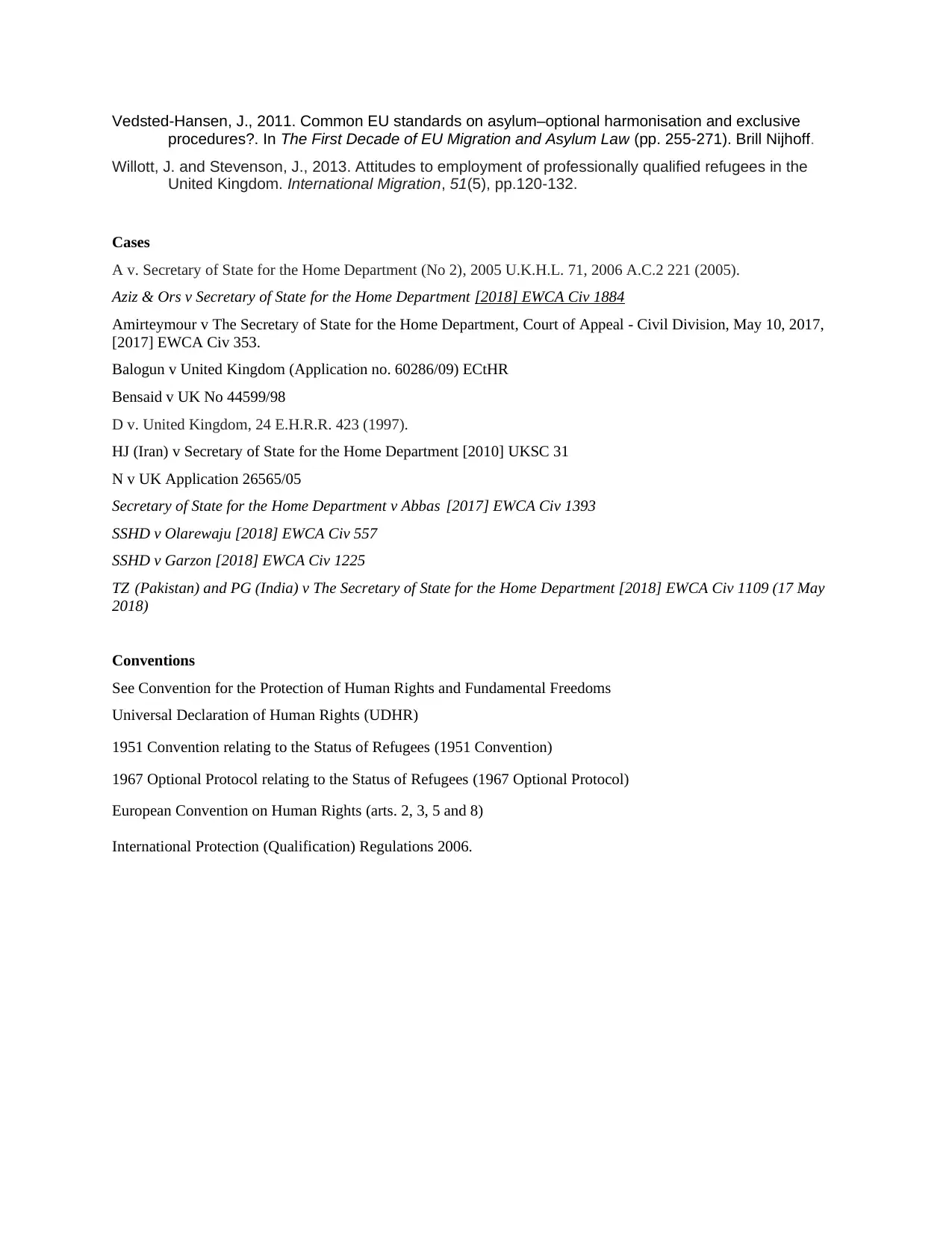
Vedsted-Hansen, J., 2011. Common EU standards on asylum–optional harmonisation and exclusive
procedures?. In The First Decade of EU Migration and Asylum Law (pp. 255-271). Brill Nijhoff.
Willott, J. and Stevenson, J., 2013. Attitudes to employment of professionally qualified refugees in the
United Kingdom. International Migration, 51(5), pp.120-132.
Cases
A v. Secretary of State for the Home Department (No 2), 2005 U.K.H.L. 71, 2006 A.C.2 221 (2005).
Aziz & Ors v Secretary of State for the Home Department [2018] EWCA Civ 1884
Amirteymour v The Secretary of State for the Home Department, Court of Appeal - Civil Division, May 10, 2017,
[2017] EWCA Civ 353.
Balogun v United Kingdom (Application no. 60286/09) ECtHR
Bensaid v UK No 44599/98
D v. United Kingdom, 24 E.H.R.R. 423 (1997).
HJ (Iran) v Secretary of State for the Home Department [2010] UKSC 31
N v UK Application 26565/05
Secretary of State for the Home Department v Abbas [2017] EWCA Civ 1393
SSHD v Olarewaju [2018] EWCA Civ 557
SSHD v Garzon [2018] EWCA Civ 1225
TZ (Pakistan) and PG (India) v The Secretary of State for the Home Department [2018] EWCA Civ 1109 (17 May
2018)
Conventions
See Convention for the Protection of Human Rights and Fundamental Freedoms
Universal Declaration of Human Rights (UDHR)
1951 Convention relating to the Status of Refugees (1951 Convention)
1967 Optional Protocol relating to the Status of Refugees (1967 Optional Protocol)
European Convention on Human Rights (arts. 2, 3, 5 and 8)
International Protection (Qualification) Regulations 2006.
procedures?. In The First Decade of EU Migration and Asylum Law (pp. 255-271). Brill Nijhoff.
Willott, J. and Stevenson, J., 2013. Attitudes to employment of professionally qualified refugees in the
United Kingdom. International Migration, 51(5), pp.120-132.
Cases
A v. Secretary of State for the Home Department (No 2), 2005 U.K.H.L. 71, 2006 A.C.2 221 (2005).
Aziz & Ors v Secretary of State for the Home Department [2018] EWCA Civ 1884
Amirteymour v The Secretary of State for the Home Department, Court of Appeal - Civil Division, May 10, 2017,
[2017] EWCA Civ 353.
Balogun v United Kingdom (Application no. 60286/09) ECtHR
Bensaid v UK No 44599/98
D v. United Kingdom, 24 E.H.R.R. 423 (1997).
HJ (Iran) v Secretary of State for the Home Department [2010] UKSC 31
N v UK Application 26565/05
Secretary of State for the Home Department v Abbas [2017] EWCA Civ 1393
SSHD v Olarewaju [2018] EWCA Civ 557
SSHD v Garzon [2018] EWCA Civ 1225
TZ (Pakistan) and PG (India) v The Secretary of State for the Home Department [2018] EWCA Civ 1109 (17 May
2018)
Conventions
See Convention for the Protection of Human Rights and Fundamental Freedoms
Universal Declaration of Human Rights (UDHR)
1951 Convention relating to the Status of Refugees (1951 Convention)
1967 Optional Protocol relating to the Status of Refugees (1967 Optional Protocol)
European Convention on Human Rights (arts. 2, 3, 5 and 8)
International Protection (Qualification) Regulations 2006.
⊘ This is a preview!⊘
Do you want full access?
Subscribe today to unlock all pages.

Trusted by 1+ million students worldwide
1 out of 12
Your All-in-One AI-Powered Toolkit for Academic Success.
+13062052269
info@desklib.com
Available 24*7 on WhatsApp / Email
![[object Object]](/_next/static/media/star-bottom.7253800d.svg)
Unlock your academic potential
Copyright © 2020–2026 A2Z Services. All Rights Reserved. Developed and managed by ZUCOL.


